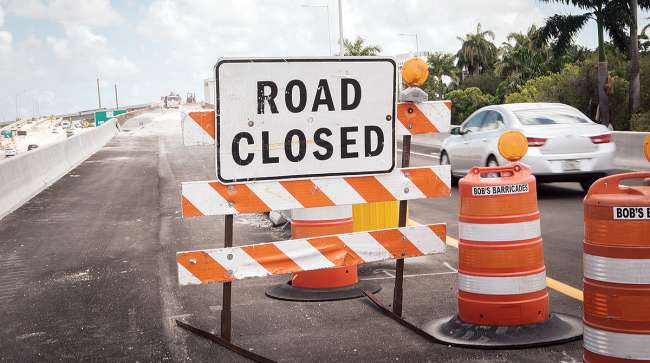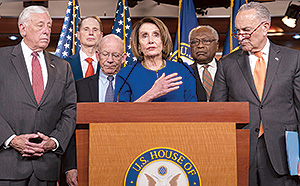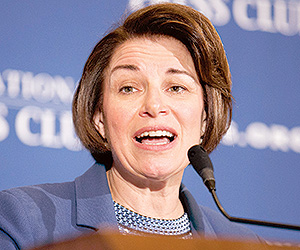Senior Reporter
Missing in Action on Capitol Hill: A Debate on Infrastructure Funding Policy

[Stay on top of transportation news: Get TTNews in your inbox.]
Infrastructure policy, which was seen as a bright legislative point at the start of the year capable of reaching President Donald Trump’s desk, is now hardly mentioned by the president and leaders on Capitol Hill.
Since the collapse of negotiations in May with House Speaker Nancy Pelosi and her caucus on a $2 trillion infrastructure measure, Trump has not publicly addressed the issue. Instead, he turned his focus on immigration and his re-election efforts.
Pelosi (D-Calif.), who blames Trump for the negotiation’s collapse, and Senate Leader Mitch McConnell (R-Ky.) have not directed the tax-writing committees to address the looming insolvency of the nation’s highway account. Dwindling revenue from the federal fuel tax backs the Highway Trust Fund account.

Pelosi (center) and Senate Minority Leader Chuck Schumer (right) with other congressional leaders after the failed infrastructure meeting with Trump in May. (J. Scott Applewhite/Associated Press)
After the White House suggested infrastructure policy would be a front-and-center issue in 2019, most transportation stakeholders and policy observers had expressed optimism about a measure’s chances. Nearly eight months later, not so much.
Even the consideration of a comprehensive highway policy bill Aug. 1 by the Senate Environment and Public Works Committee, which would cover surface transportation programs, has stopped short of eliciting enthusiasm across the transportation community. The Senate panel lacks jurisdiction over the thorny funding matter, and the current highway law, the Fixing America’s Surface Transportation (FAST) Act, expires in the fall of 2020.
Marcia Hale, president of the Building America’s Future advocacy group, is not anticipating infrastructure policy to gain significant momentum on Capitol Hill during next year’s general election cycle. As far as the FAST Act’s reauthorization, she expects Congress to miss its fall deadline and advance short-term extensions to keep programs active.
“The House and Senate need to be talking about issues that the American public cares about. And our poisonous political debate at the moment is obviously not helping that, and quite hindering it,” Hale told Transport Topics on July 17, stressing that other national concerns are being stymied by the Beltway’s political climate.
“I do think you’ll hear more about infrastructure starting this fall and throughout the primary season. And I would think that the Trump administration — the Trump campaign — might have something to say about it, as well.”
Advancing a major infrastructure bill will necessitate the White House’s leadership, Hale said: “So anything that [Trump] can do to help move the issue is not only good, but absolutely needed to make anything happen.”
“I don’t have a lot of optimism,” added Eno Center for Transportation senior fellow Jeff Davis. “The closer we get to reauthorizing the FAST Act, the more that that is going to become the focus.”
David Ditch, a budget and transportation associate in the Grover M. Hermann Center for the Federal Budget at The Heritage Foundation, argued that reauthorizing highway policy programs is likely to take a back seat to budget and spending obligations on Capitol Hill. The group is an advocate for devolving transportation funding responsibilities to states.
“If we were imposing the same amount of gas tax that we currently do but that gas tax was more being taxed and spent at the state and local level, there will be more value,” Ditch told Transport Topics, “and at the same time we could manage to get rid of the trust fund deficiency.”
To be sure, groups such as the U.S. Chamber of Commerce call on Congress to follow dozens of states’ lead and approve an increase of the 24.4 cents-per-gallon diesel tax and 18.4 cents-per-gallon gas tax to boost the trust fund.

Klobuchar by Jacquelyn Martin/AP
While Trump is mute on the subject, several presidential aspirants have brought up infrastructure policy. Sen. Amy Klobuchar (D-Minn.), a member of the Commerce Committee with jurisdiction over the trucking industry, was at the National Press Club in Washington on July 16 to promote a $1 trillion proposal aimed at modernizing freight and passenger corridors.
“I will get that bill introduced in the first 100 days and get it done by the end of the year. Both Democrats and Republicans have been waiting throughout this administration to see a major infrastructure package. Two years and seven months later since the president won his election, we’re still waiting,” said Klobuchar.
Trump also had promised an infrastructure package during his first 100 days in office.
Reacting to the collapse of the White House’s negotiations on infrastructure in May, Sen. Kamala Harris (D-Calif.), another candidate seeking to occupy the Oval Office, said Trump was deliberately avoiding working with Pelosi on fixing roads and bridges to pressure an end to the House’s investigations into his campaign and financial holdings.

